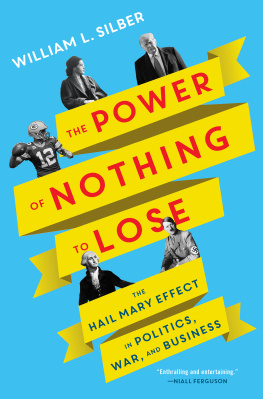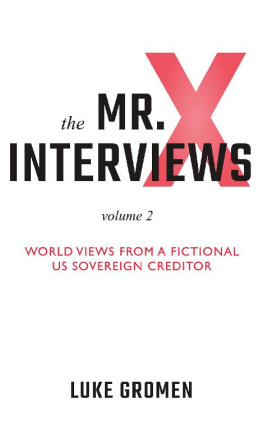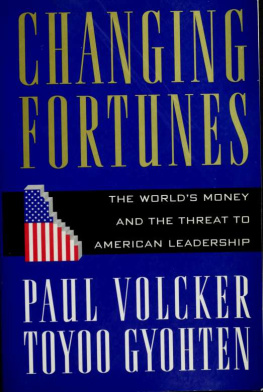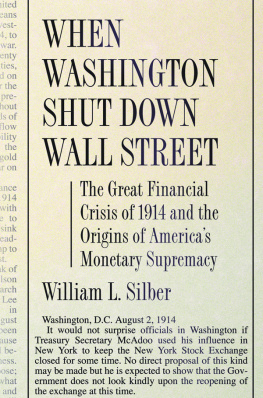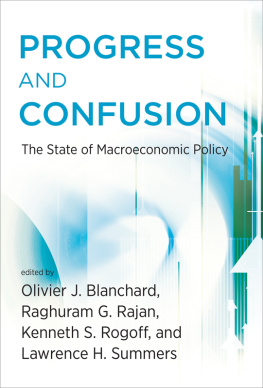William L. Silber is one of Americas most respected experts on fi nance and banking. He is currently Marcus Nadler Professor of Finance and Economics and director of the Glucksman Institute for Research in Securities Markets, at the Stern School of Business, New York University. He has written numerous books and articles on economics and fi nancial history, most recently When Washington Shut Down Wall Street: Th e Great Financial Crisis of 1914 and the Origins of Americas Monetary Supremacy.
When Washington Shut Down Wall Street: The Great Financial Crisis of 1914 and the Origins of Americas Monetary Supremacy
Financial Options: From Theory to Practice (coauthor)
Principles of Money, Banking, and Financial Markets (coauthor)
Financial Innovation (editor)
Money (coauthor)
Portfolio Behavior of Financial Institutions
VOLCKER
The Triumph of Persistence
WILLIAM L. SILBER

In Memory of Pauline R. and Joseph F. Silber
Contents
Introduction
More Than a Central Banker
Five American presidents, three Democrats and two Republicans, spanning nearly half a century, have called on Paul A. Volcker to serve the government and the people of the United States. John F. Kennedy made him deputy undersecretary of the treasury for monetary affairs in 1963; Richard Nixon named him undersecretary of the treasury for monetary affairs in 1969; Jimmy Carter appointed him chairman of the Federal Reserve Board, Americas central bank, in 1979; Ronald Reagan reappointed him chairman in 1983; and in 2008, President-elect Barack Obama named him chairman of the Presidents Economic Recovery Advisory Board.
Carlo Ciampi, the former president of Italy, sent Volcker a three-word letter upon hearing of President Obamas assignment. The message sits in a chrome frame on Pauls desk: We trust you.
Volcker earned his unparalleled credibility over the course of his professional career by approaching public service as a sacred trust. His contributions spread beyond the narrow confines of finance, including investigating the oil-for-food scandal at the United Nations and chairing the commission to settle claims against Swiss banks by victims of the Holocaust. But his tenure as chairman of the Federal Reserve Board between 1979 and 1987 built his legacy. During that time, Volcker did nothing less than restore the reputation of an American financial
This book began as the story of a determined central banker who confounded the critics while defeating an entrenched inflation in America, but turned out to be much more. I will show that Paul A. Volcker not only restored price stability in the United States, but also led a battle for fiscal responsibility in America. Volcker never held elective office, but his refusal to accommodate the Reagan-era budget deficits by creating moneywhat economists call monetizing the deficitforced up real interest rates during the mid-1980s until Congress delivered a plan to balance the budget.
Volcker relied on public opinion, integrity, and persistence to overcome the political pressure to finance government spending the easy way, by printing money rather than by taxation. Congress created the Federal Reserve System, Americas central bank, and can abolish it with a simple majority vote. Volcker deflected repeated threats, including a bill of impeachment, and stuck to his principles. His tenure at the Federal Reserve began the process of reining in the deficit. Volcker promoted the goal of fiscal integrity that Ronald Reagan had promised to the American people, turning Reagan into Reagan.
Foreigners rewarded the United States for its monetary and fiscal discipline by investing in U.S. securities and by treating the dollar as a safe haven currency. The United States enjoys lower interest rates and a higher standard of living because countries from China to South Korea send clothing and childrens toys to America in exchange for U.S. dollars. Current Federal Reserve chairman Ben Bernanke credits Volckers policies with setting the stage for decades of economic growth and stability.
Volckers linkage of responsible monetary policy with fiscal virtue carries a message for today, as the United States emerges from the greatest financial crisis since the Great Depression. Unprecedented low interest rates and easy money policies to lower unemployment provoke fears of rekindling inflation when the economy recovers, and the enormous structural budget deficit confronting America fans those fears. The Federal Reserve promises to reverse field to contain inflationary pressures, but that commitment is suspect, with the memory of recession still fresh, unless Congress and the president agree to a balanced budget at full employment. Reckless fiscal policy threatens the dollars status as a reliable international store of value and the exorbitant privilege that confers on American consumers.
The need to integrate monetary and fiscal policies gained intellectual currency in 2011, when Thomas Sargent was awarded the Nobel Prize in Economics. The New York University economist considers that Good monetary policy is impossible without good fiscal policy. Sargent advanced the concept of rational expectations in economic behavior and offered historical evidence from the hyperinflations of the 1920s that credible monetary policy needs grounding in fiscal responsibility. Volcker learned the power of expectations while an apprentice on the trading desk at the Federal Reserve Bank of New York. I will show that his subsequent policies revealed an appreciation of rational expectations before that principle gained acceptance.
This book is divided into four parts. Part 1 sets the stage, describing Volckers formative years at home, in school, and his early work experience at the Federal Reserve Bank of New York. part 2 chronicles his role surrounding President Nixons suspension of the dollars convertibility into gold on August, 15, 1971, Americas final break with the gold standard, which Volcker considers the most significant single event in his career. Part 4 describes his role in formulating what President Obama labeled the Volcker Rule in 2010, designed to protect the American taxpayer from having to repeat a bailout of a crippled financial system. A brief prologue weaves the common theme underlying the three crises1971, 1979, and 2010that tested Paul Volcker.
This biography of Volckers professional life tells the story of how principle, determination, and pragmatism blend into effective leadership. Volcker understood the need to compromise, and some of his concessions, such as the bailout of Continental Illinois, the seventh-largest U.S. bank in 1984, set a costly precedent in public policy. But he knew where to draw the line, when to build credibility and when to spend it. And that good judgment turned Paul Volcker into an American financial icon.
Paul cooperated in this project by arranging for the release of thousands of documents from the U.S. Treasury and the Federal Reserve System that are the foundation of this biography. He added a personal touch by sitting (not always happily) for one hundred hours of interviews. He also shared his school records and reports that had been carefully guarded by his mother, Alma Volcker. However, this is not an authorized biography: Paul did not think it appropriate to exercise editorial control over the final product. He refused to read it until after it went to press. Nevertheless, Volckers presence towered over this project despite his efforts to impose distance. He is alive and well at the writing of this final draft, and that surely had an impact on my thinking.


